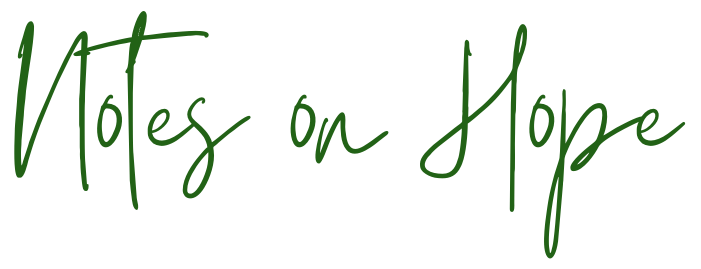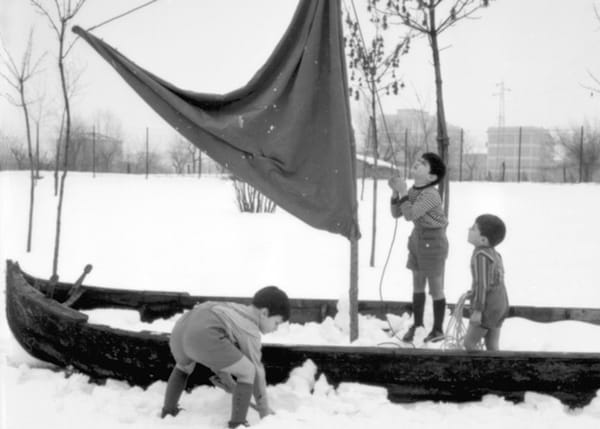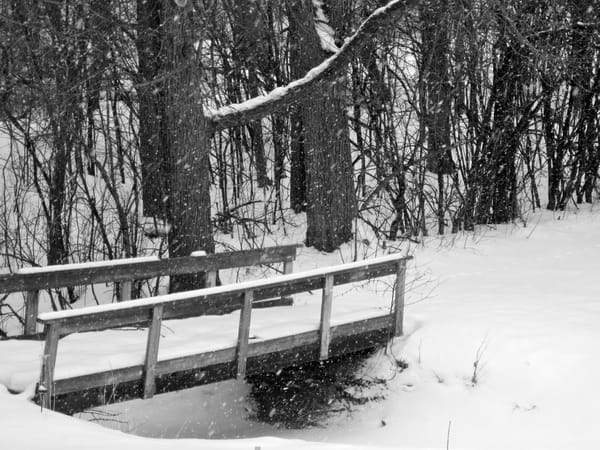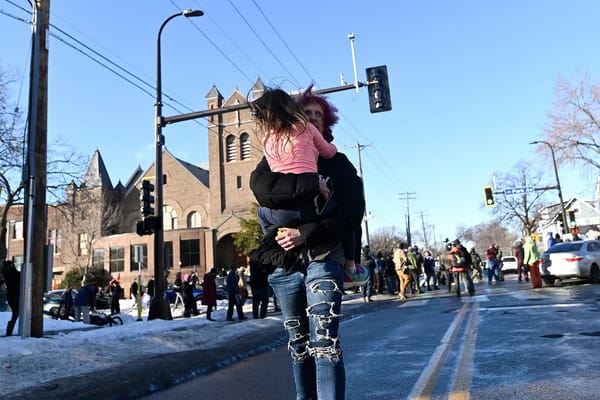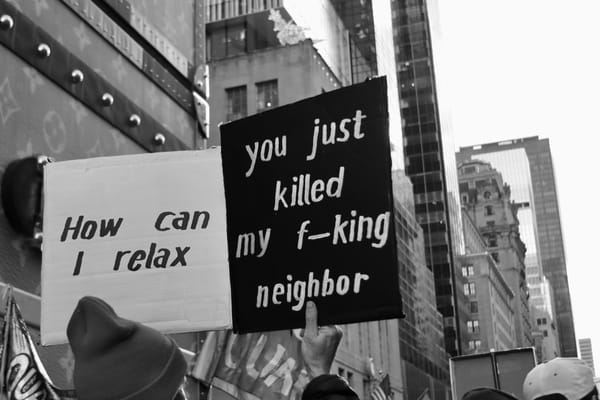Raising Brave Children
Parenting with conscience and courage in an age of fear
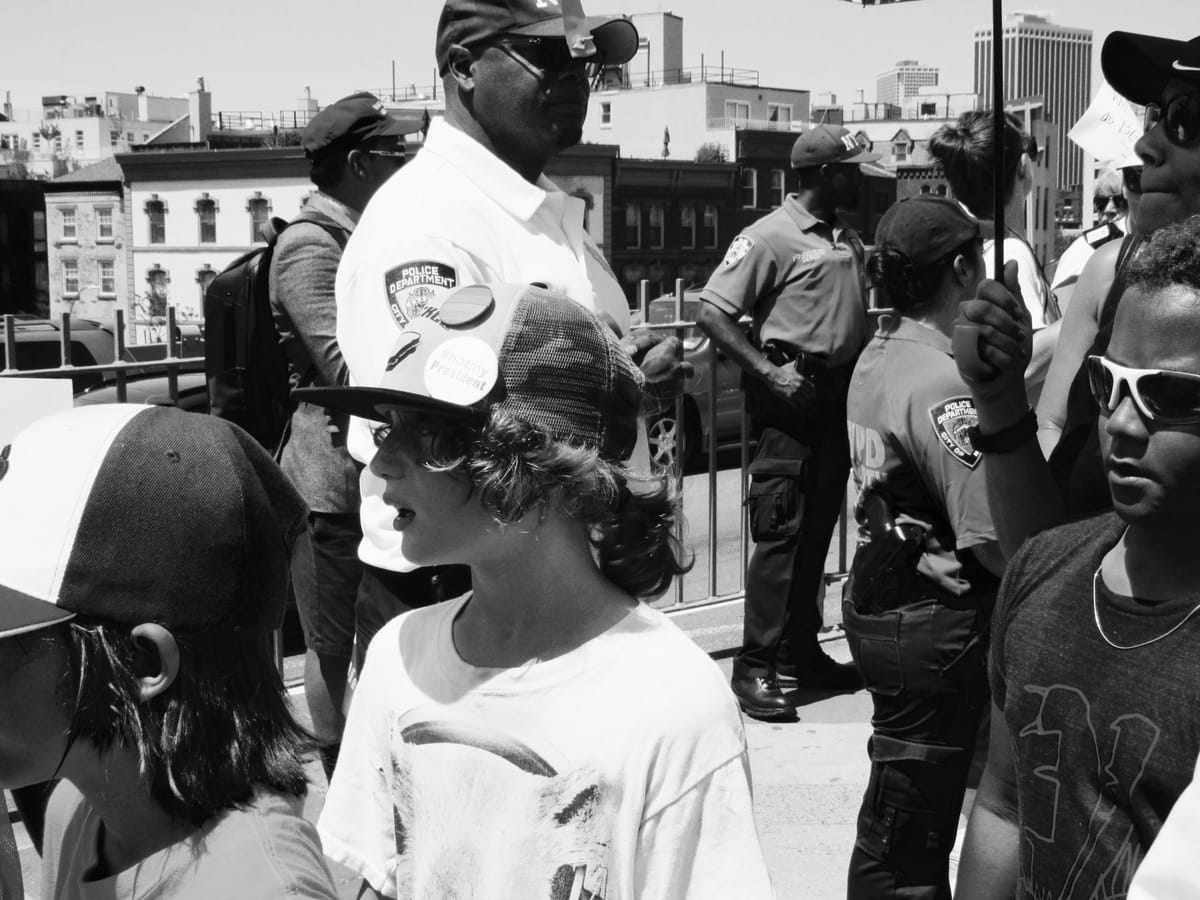
Mimesis
My daughter
wouldn’t hurt a spider
That had nested
Between her bicycle handles
For two weeks
She waited
Until it left of its own accord
If you tear down the web I said
It will simply know
This isn’t a place to call home
And you’d get to go biking
She said that’s how others
Become refugees isn’t it?
~Fady Joudah
This week, an eight-year-old girl named Charlotte stood up at the end of a town hall in Connecticut to explain that she was worried about the free lunch program in her school ending, because she didn’t want any of her friends to be hungry or to feel embarrassed by needing to tell their teacher or the cafeteria staff that they couldn’t pay for lunch. I am always struck by the matter-of-fact way children demonstrate their understanding of justice and the boldness with which they speak up for one another.
I’ve dedicated my career to children, and I love spending time with them. But I don’t actually believe that children are inherently better than adults. Anyone who has spent considerable time with children, or remembers childhood accurately rather than through rose-tinted recollections, knows that children are frequently impulsive and are quite capable of wielding exclusion and insults as sharply as any adult. To view children as somehow perfectly pure or superior is to deny their full humanity and their developmental learning curve.
However, it is true that children are uniquely consumed by justice and fairness, and this does tend to become increasingly muted as we age. Children are, after all, just beginning to discover the ins and outs of friendship and of learning how to develop and manage the networks of relationships and conflicting needs that define community. The business of connecting with other people and all the friction that doing so entails—negotiating over sharing resources, exchanging ideas, determining who will lead and who will follow, building trust, and repairing harm—this is the primary occupation of childhood.
Additionally, though it takes a long time for children to develop the perspective-taking skills that are necessary to truly understand another person’s viewpoint in a rational way, their capacity to empathize on an emotional level is neurologically robust even at birth, and their tendency toward magical thinking often extends their empathetic reach widely, as they eagerly imbue anything, even an inanimate object or a spider, with emotion and intentionality. As a result, children are quick to identify harm and declare it unacceptable. While it is important to wrestle with the complexity of multiple perspectives and to develop an increasing facility for nuance over time, there is also something to be said for the uncompromising way in which children understand and advocate for care and fairness.

It is difficult to know how to parent right now. In fact, as demographic data and an array of headlines indicate, it’s difficult to know even whether to parent right now. While it is important to recognize the ways in which, though it may not always feel so, life has improved markedly when viewed through the wide lens of history, it is also important to recognize the palpable threats that make this a daunting and profoundly uncertain time to raise a child. Even if we, momentarily, put aside large-scale issues like climate change, it is unnerving to be responsible for a young life while wondering whether they will have access to the vaccines, basic rights, and educational institutions that existed for us but are teetering precariously. We are not facing a singular threat, but a multiplicity of threats, and this makes it an especially scary time to have your heart walking around out in the world in the vulnerable form of a child, let alone to contemplate handing our children a future that will undoubtedly be stormy and dangerous in ways we hesitate to fully imagine.
All of these fears make it particularly difficult to commit to raising brave children, who are equipped to recognize the significance of other people’s needs and rights and stand up for them, as Charlotte did. This is coupled with the fact that today’s children have quite literally been trained to hide in order to survive. From a virus that kept them sheltered at home for months on end, to wildfire smoke that periodically keeps children similarly sequestered, to routine lock down drills in schools where children learn to barricade doors and hide in closets, we have created a set of circumstances that require constant instruction in hiding and taking shelter from very real and present external threats.
And yet, because of these very same threats, it is essential that we raise children who are capable of distinguishing between the moments that necessitate taking shelter and the moments that call for bold and vociferous action on behalf of each other and of their collective future. As Hannah Arendt warned, it should not be the responsibility of children to save their own future or to alter the political landscape. We, as adults, are called to love the world enough to take responsibility for its brokenness, and it should not be an eight-year-old’s responsibility to speak up at a town hall and call the adults to account. Nonetheless, at this moment, we adults would do well to listen to brave children like Charlotte, who understand that the needs and dignity of their own friends’ are at stake and are deserving of protection. Additionally, the responsibility to consider the adults we hope our children will become, and to do so within the context of the world we anticipate they will need to navigate, is at the heart of parenting. Currently, the odds seem pretty good that we will need to raise a lot of Charlottes.
The writer and lawyer, Elie Mystal, recently reflected on this question of how we raise children with conscience and courage in an age that increasingly seems to mirror the most ominous dystopian fiction of the past. He says, “We’re going to need to teach our children skills that we never had, to face a future different from anything we ourselves experienced.” This resonates deeply. While it is true that much of what we are currently facing has been faced before, the future we are confronting surely promises challenges we anticipated teaching our children about in history books, as they continued to work along an arch of progress that bent, if at times slowly, at least in the direction of justice, not coaching them to confront the worst moments of our past again. And they will likely need to do this while also facing new crises, like climate change, which are largely the result of our own generation’s failures.
It is right that we want to protect our children from adversity, and, to Arendt’s point, our inability to do so and the necessity we now face of preparing them to repair damage they ought not be responsible for, is largely a signifier of just how far down the wrong road we’ve gone. But here we are. We must find a way to raise children who have hope, who can recognize the beauty in the world so they understand that there is much that is worth fighting for, and who can envision a more just world for themselves and for their friends. Simultaneously, we will also have to raise children who understand that none of this is guaranteed and who are equipped to be braver than most of us have had to be. Mystal concludes with painful but appropriate bluntness,
“Everybody wants to raise Barack Obama. I’ve got to start trying to raise Harriet Tubman. In a worst case scenario, I have to be raising Oskar Schindler. I need my kids to be able to chloroform a baby they’re hiding in their attic when ICE comes around, then walk downstairs and pay Musk’s troops in Bitcoin to make them go away.”
These are surely not the skills and demeanors we imagined needing to cultivate in our children when we first cradled them in our arms and promised them their wildest dreams. And we can’t suddenly expect children to demonstrate levels of bravery that most adults aren’t able to muster, nor should we begin some sort of doomsday boot camp for our kids. But I do think that we will need to nurture and encourage the developmental tendency children already possess to scan for fairness and injustice, and we will need to bolster their instinct to act on those observations. I think we will need to allow them to practice bravery when opportunities present themselves, even when this challenges our own instinct to protect them. And I think we will need to cultivate our children’s ability to recognize and assess risk with greater nuance and strategic thinking than we likely envisioned, so they are prepared to act with courage, while also taking care to understand when it is helpful to stand in front of a friend and when it is necessary to pull that friend into the closet with you.

Perhaps most importantly, I don’t think that parenting with a realistic perspective on the crises we face necessitates that we raise children who are tougher, thicker skinned, or more cynical. In fact, I think it’s imperative that we do the opposite. No one puts themselves on the line to protect another person because they are calloused or because they expect the worst. We put ourselves on the line for each other when our hearts are too soft and open to stand for suffering and when we believe that our actions matter and stand a chance of making the world better. We need to cultivate this sensibility in our children as well.
The author and former teacher, Margaret Renkl, recently wrote,
“Fury is a powerful motivator of resistance, but there is only so much rage a person can harbor without nurturing something cold and still and hard in the place where a warm, living heart once beat…Anger lets in too little beauty, but heartbreak? A tender heart feels the fury and the fear, the sorrow and suffering, the beauty and the bravery alike. In the years ahead, we will need them all.”
Raising our children to be braver than we want them to need to be will take courage from us as parents, too. We will need to model bravery ourselves, perhaps more than we have become accustomed to calling forth. We will also need to allow our children to take risks that may make our hearts race at times. And I’m not speaking of the academic or physical risks that we are used to considering in our achievement driven culture, which are largely confined to rigorous classrooms and competitive soccer games. Instead, we will need to get comfortable with encouraging risks of conscience—the kinds of risks that involve speaking out for others or acting to protect them.
Our children will need to develop a form of bravery that grows from a fiercely tender heart and a commitment to fight for other people’s rights—not only for their own place in a sea of constructed hierarchies. In order to cultivate this spirit of courageous compassion in our children and shift the line of history back onto a path that leads forward rather than backward, we will also need to become increasingly comfortable putting our own tender hearts on the line.
Wishing you the tenderness and courage that children show,
Alicia
A few things I found helpful & hopeful this week…
- The video of Charlotte speaking at the town hall in Connecticut is linked above, but I’m linking it here as well. It’s worth watching both her question and the response.
- If you have not yet seen the video of the Finn cast being welcomed on stage by Guster and performing at the Kennedy Center, after having their show canceled, give it a watch. It is beautiful and moving in all the best ways. You can also read more about the background of why this moment happened here.
- As research sites are being purged and taken down, one scholar is working to create a “Wikipedia of K-12 research,” so crucial education data isn’t lost and remains accessible.
- Finally, this essay is a month old, but I just got around to reading it. It may not feel hopeful at the outset, but I promise it’s worth reading to the end: What Felt Impossible Became Possible
If you think someone else in your life might need some hope, please share. It’s always easier to hold onto hope when we’re not doing it alone.
